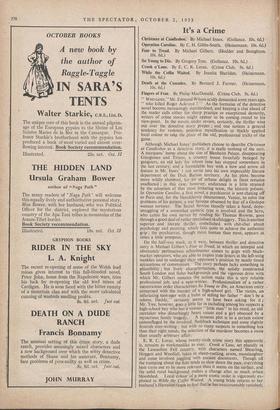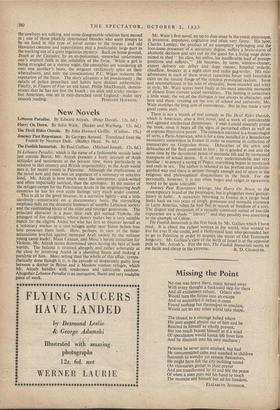It's a Crime
Fingers of Fear. By Philip MacDonald. (Crime Club. 9s. 6d.)
" WHO cares," Mr. Edmund Wilson acidly demanded some years ago, " who killed Roger Ackroyd ? " As the formulae of the detective novel become increasingly standardised, and keeping a clue ahead of
the reader calls either for sharp practice or exceptional dexterity, writers of crime stories might appear to be coming round to his view-point. In the novels under review, certainly, the thriller wins out over the detective story proper ; and one notices a general tendency for violence, pointless mystification or thickly applied local colour to take the place of the old, professional tricks of the game.
Although Michael Innes' publishers choose to describe Christmas at Candleshoe as a detective story, it is really nothing of the sort.
A marquess' home about .the size of Blenheim Palace, disappearing Giorgiones and Titians, a country house forcefully besieged by gangsters, an old lady for whom time has stopped somewhere in the last century: and a formidable boy with a bow and arrow all feature in Mr. Innes' I test sortie into his own impeccably literate department of the Dick Barton territory. As his plots become
more wildly cluttered, his air of urbane delight in them remains unaffected ; in this case, however, endurance is a little strained by the adoption of that most irritating tense, the historic present. In Operation Caroline, a first novel, a psychiatrist is sent chasing off
to Paris and, for the bloodthirsty denouement, Venice, to solve the problems of his patient, a war heroine obsessed by fear of a Gestapo woman torturer. The Secret Service blandly takes a hand, dope- smuggling of a somewhat esoteric type is involved and the hero, who calms his own nerves by reading Sir Thomas Browne, goes through a good deal of rather specialised skullduggery. This is another superior and literate thriller, embellished with chit-chat about psychology and painting, which fails quite to achieve the authentic grip ; the psychiatrist, though more human than most, appears at times a little pompous.
On the half-way mark, as it were, between thriller and detective story is Michael Gilbert's Fear to Tread, in which an intrepid and
obstinately pertinacious schoolmaster comes to grips with black- market operators, who are able to inspire irate letters in the left-wing weeklies and to endanger their opponent's position by neatly timed accusations of communism. The story perhaps lacks something in plausibility ; but lively characterisation, the solidly constructed South London and Soho backgrounds and the vigorous drive with
which Mr. Gilbert sustains the action make this a very reliable professional job, and a near-winner. Professionalism of a rather meretricious order Characterises So Young to Die, an American entry
concerned with the murder of a high-school girl. The victim, an infuriating teen-ager with a habit of telling her father " don't be a schmo, Daddy," certainly seems to have been asking for it ; Mr. Tree, however, goes a little far in including among his suspects a high-school boy who has a sinister "little man" in his mind, an old caretaker who disturbingly hears voices and a girl obsessed by a mysterious family tragedy. A tenuous plot is to a certain extent camouflaged by the involved, flashback technique and some slightly feverish over-writing ; but with so many suspects in something less than their right minds, the selection of the murderer becomes a more than usually arbitrary affair.
E. R. C. Lorac, whose twenty-sixth crime story this apparently is, remains as workmanlike as ever. Crook o'Lune, set placidly in
the Lancashire Fell country, with characters named Shearling,
Hoggett and Woolfall, takes in sheep-rustling, arson, manslaughter and some involved juggling with ancient documents. Though all
the tramping about the fells tends to slow down the pace, everything
here turns out to be more relevant than it seems on the surface, and the solid rural background makes a change, after so much urban bloodshed. Local colour of a more exotic order is vigorously ex- ploited in While the Coffin Waited. A young bride returns to her husband's Hawaiian ranch to find that he has unaccountably vanished;
the cowboys are sulking, and some disagreeable relatives have moved in ; one of those pluckily determined blondes who seem always to be on hand in this type of novel comes to the rescue ; and old Hawaiian customs and superstitions play a predictably large part in the working out of a quite ingenious mystery. Back on home ground, Death at the Cascades, by an ex-policeman, somewhat undermines one's implicit faith in the reliability of the force. While a girl is being strangled on a stormy night, the constables are wandering all over one another's beats, the sergeant vindictively spies on their whereabouts, and only the conscientious P.C. Wigan redeems the reputation of the force. The story advances a bit ponderously ; the details of police procedure and habits have distinct authenticity. Finally, in Fingers of Fear an old hand; Philip MacDonald, demon- strates that he has not lost the knack ; six slick and ,tricky stories— five American, one set in rain-drenched rural England—make very



















































 Previous page
Previous page